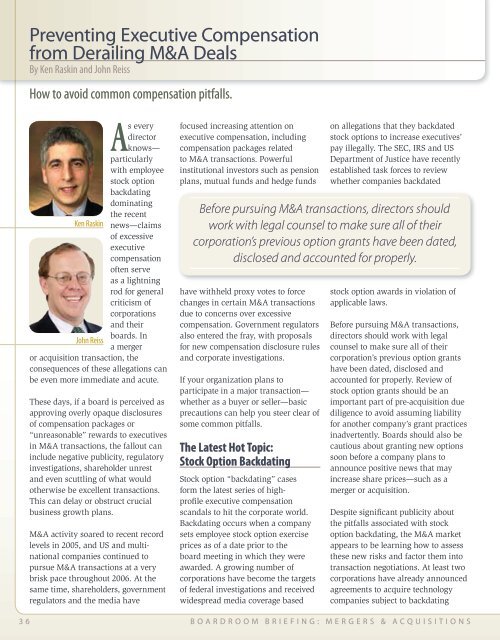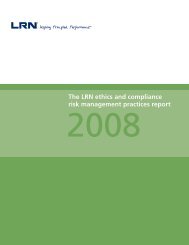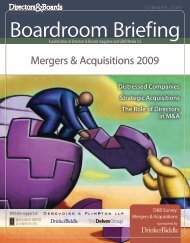Boardroom Briefing: Mergers & Acquisitions - Directors & Boards
Boardroom Briefing: Mergers & Acquisitions - Directors & Boards
Boardroom Briefing: Mergers & Acquisitions - Directors & Boards
Create successful ePaper yourself
Turn your PDF publications into a flip-book with our unique Google optimized e-Paper software.
Preventing Executive Compensation<br />
from Derailing M&A Deals<br />
By Ken Raskin and John Reiss<br />
How to avoid common compensation pitfalls.<br />
As every<br />
director<br />
knows—<br />
particularly<br />
with employee<br />
stock option<br />
backdating<br />
dominating<br />
the recent<br />
Ken Raskin news—claims<br />
of excessive<br />
executive<br />
compensation<br />
often serve<br />
as a lightning<br />
rod for general<br />
criticism of<br />
corporations<br />
and their<br />
boards. In<br />
John Reiss<br />
a merger<br />
or acquisition transaction, the<br />
consequences of these allegations can<br />
be even more immediate and acute.<br />
These days, if a board is perceived as<br />
approving overly opaque disclosures<br />
of compensation packages or<br />
“unreasonable” rewards to executives<br />
in M&A transactions, the fallout can<br />
include negative publicity, regulatory<br />
investigations, shareholder unrest<br />
and even scuttling of what would<br />
otherwise be excellent transactions.<br />
This can delay or obstruct crucial<br />
business growth plans.<br />
M&A activity soared to recent record<br />
levels in 2005, and US and multinational<br />
companies continued to<br />
pursue M&A transactions at a very<br />
brisk pace throughout 2006. At the<br />
same time, shareholders, government<br />
regulators and the media have<br />
focused increasing attention on<br />
executive compensation, including<br />
compensation packages related<br />
to M&A transactions. Powerful<br />
institutional investors such as pension<br />
plans, mutual funds and hedge funds<br />
have withheld proxy votes to force<br />
changes in certain M&A transactions<br />
due to concerns over excessive<br />
compensation. Government regulators<br />
also entered the fray, with proposals<br />
for new compensation disclosure rules<br />
and corporate investigations.<br />
If your organization plans to<br />
participate in a major transaction—<br />
whether as a buyer or seller—basic<br />
precautions can help you steer clear of<br />
some common pitfalls.<br />
The Latest Hot Topic:<br />
Stock Option Backdating<br />
Stock option “backdating” cases<br />
form the latest series of highprofile<br />
executive compensation<br />
scandals to hit the corporate world.<br />
Backdating occurs when a company<br />
sets employee stock option exercise<br />
prices as of a date prior to the<br />
board meeting in which they were<br />
awarded. A growing number of<br />
corporations have become the targets<br />
of federal investigations and received<br />
widespread media coverage based<br />
on allegations that they backdated<br />
stock options to increase executives’<br />
pay illegally. The SEC, IRS and US<br />
Department of Justice have recently<br />
established task forces to review<br />
whether companies backdated<br />
Before pursuing M&A transactions, directors should<br />
work with legal counsel to make sure all of their<br />
corporation’s previous option grants have been dated,<br />
disclosed and accounted for properly.<br />
stock option awards in violation of<br />
applicable laws.<br />
Before pursuing M&A transactions,<br />
directors should work with legal<br />
counsel to make sure all of their<br />
corporation’s previous option grants<br />
have been dated, disclosed and<br />
accounted for properly. Review of<br />
stock option grants should be an<br />
important part of pre-acquisition due<br />
diligence to avoid assuming liability<br />
for another company’s grant practices<br />
inadvertently. <strong>Boards</strong> should also be<br />
cautious about granting new options<br />
soon before a company plans to<br />
announce positive news that may<br />
increase share prices—such as a<br />
merger or acquisition.<br />
Despite significant publicity about<br />
the pitfalls associated with stock<br />
option backdating, the M&A market<br />
appears to be learning how to assess<br />
these new risks and factor them into<br />
transaction negotiations. At least two<br />
corporations have already announced<br />
agreements to acquire technology<br />
companies subject to backdating<br />
3 6 B o a r d r o o m B r i e f i n g : M e r g e r s & A c q u i s i t i o n s





![[link to PDF] for a copy of the briefing paper - Directors & Boards](https://img.yumpu.com/43729022/1/190x245/link-to-pdf-for-a-copy-of-the-briefing-paper-directors-boards.jpg?quality=85)







